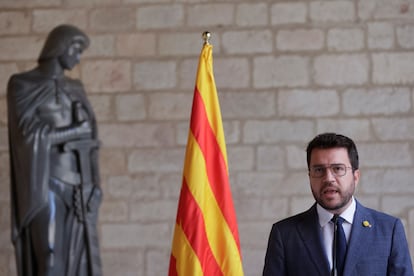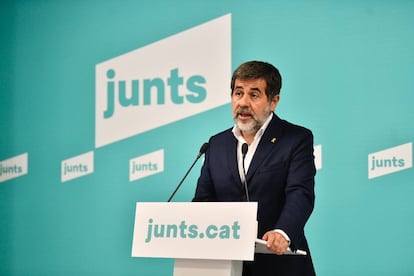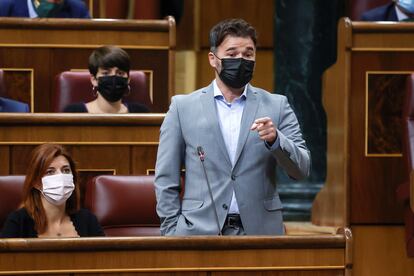Ahead of talks with Spanish PM on future of Catalonia, coalition partners split over interlocutors
Regional premier Pere Aragonès has rejected two team members proposed by Together for Catalonia on the basis that they are not current members of the Cabinet

Members of Spain’s central and Catalan governments are scheduled to meet on Wednesday in Barcelona for highly anticipated negotiations on the future of the northeastern region, where separatist politicians led an unsuccessful unilateral secession attempt in late 2017.
Although Spanish Prime Minister Pedro Sánchez confirmed on Monday night that he would attend the talks, along with several of his ministers, it is still unclear who will be on the other side of the table. On Tuesday, Catalan premier Pere Aragonès of the Catalan Republican Left (ERC) rejected two of the names put forward by his coalition partner Together for Catalonia (JxCat), arguing that these individuals are not Cabinet members and therefore cannot represent the Catalan government.
The two candidates are former Catalan presidency minister Jordi Turull and Jordi Sànchez, the current secretary general of JxCat and a former leader of the pro-independence civil society group Catalan National Assembly. They are both well-known public figures and were among the leadership of the illegal breakaway attempt in 2017. They were tried and convicted for their actions by the Supreme Court, and later pardoned by the Spanish government in a controversial decision.
Aragonès requested that JxCat propose other names for the talks with Madrid from among members of the current Catalan executive. “We have an opportunity and I’m not planning on throwing it away,” he said, insisting that at the talks he would defend an independence referendum and full amnesty for all of the separatists involved in the breakaway attempt. “Delegations are government delegations, it’s the way to represent the entire country. I ask for the utmost loyalty from everyone; it’s not loyalty to a party person, but to the top representative of self-government.”

But the party presided by Carles Puigdemont – who was Catalan premier at the time of the secession attempt and fled to Belgium to avoid prosecution – refused, and so a meeting that aims to address a years-long political conflict is likely to be held with two empty chairs, underscoring the internal fracture within the Catalan government.
Puigdemont’s party has always expressed skepticism about dialogue with Madrid, while ERC sees these talks as part of its plan to force the Spanish government to accept a legal independence referendum in the region – something that Prime Minister Pedro Sánchez has repeatedly said is not possible.
Meanwhile, Sánchez has asked ERC not to set a time limit on the talks, following statements by independence leaders suggesting these should be reviewed in 2024. “In order to avoid frustration, let’s not set deadlines, much less two-year deadlines. What’s happened in the last 10 years is not going to be resolved in two or three or four years,” said Sánchez, underscoring his own government’s “will, attitude and determination” to try to resolve the territorial crisis in Catalonia. Sánchez is himself at the helm of a coalition executive with junior partner Unidas Podemos, and his minority government has relied on support from Catalan parties inside Spanish Congress to get key legislation passed.
Despite the evident disagreement within the Catalan government, both Aragonès and Jordi Sànchez sought to play down its importance. “The failure of the political term cannot be measured by what happened with the negotiating table,” said the latter. The Catalan government still has several complex issues on its agenda, such as approving the 2021 budget and trying to revive derailed plans for a €1.7 billion expansion of Barcelona’s El Prat airport.

Catalonia’s governing coalition has been at odds over a number of issues since the region held an election on February 14, including how best to deal with the coronavirus pandemic. Although technically this will be the second meeting between central and Catalan officials to discuss the future of the region – the first one was held in Madrid in February 2020, just before the coronavirus pandemic hit – it will be the first with Aragonès at the helm of the Catalan government.
On Wednesday, Gabriel Rufián, spokesperson for ERC in the Spanish Congress, said that if the talks fail it will not represent a failure for the independence movement, but for the Spanish left. “And if that happens, Vox and the PP will reach La Moncloa,” he added, alluding to a hypothetical electoral victory by the far-right party Vox and the mainstream conservative Popular Party.
In October 2019, the Spanish Supreme Court sentenced nine Catalan separatist leaders to between nine and 13 years in prison after finding them guilty of sedition in connection with the unilateral breakaway attempt of October 2017. In June of this year, the Spanish government announced it was pardoning all nine in a bid to “open a new era of dialogue.”
English version by Susana Urra.
Tu suscripción se está usando en otro dispositivo
¿Quieres añadir otro usuario a tu suscripción?
Si continúas leyendo en este dispositivo, no se podrá leer en el otro.
FlechaTu suscripción se está usando en otro dispositivo y solo puedes acceder a EL PAÍS desde un dispositivo a la vez.
Si quieres compartir tu cuenta, cambia tu suscripción a la modalidad Premium, así podrás añadir otro usuario. Cada uno accederá con su propia cuenta de email, lo que os permitirá personalizar vuestra experiencia en EL PAÍS.
¿Tienes una suscripción de empresa? Accede aquí para contratar más cuentas.
En el caso de no saber quién está usando tu cuenta, te recomendamos cambiar tu contraseña aquí.
Si decides continuar compartiendo tu cuenta, este mensaje se mostrará en tu dispositivo y en el de la otra persona que está usando tu cuenta de forma indefinida, afectando a tu experiencia de lectura. Puedes consultar aquí los términos y condiciones de la suscripción digital.








































